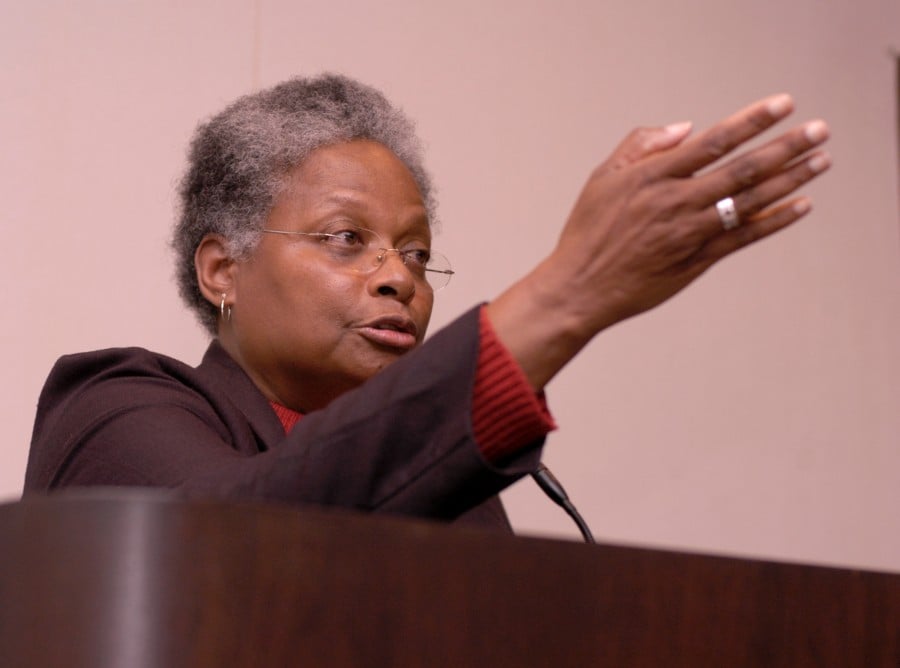Bayard Rustin, who would have been 99 years old on March 17, is not exactly a household name among the list of civil rights legends such as Martin Luther King, Jr. and Malcolm X. However, the name of this man, who led a 50-year-long career in the pursuit of justice, now graces the title of what was formerly the Queer and Allied Resource Center in the second floor of Founder’s Hall.
Officially named “The Bayard Rustin Center for LGBTQA Activism, Education, and Reconciliation,” the center seeks to continue the advancement of LGBT rights following Rustin’s hallmark principles of non-violent action.
The opening dedication for the center, held on the evening of March 16 in Founders Hall, witnessed an outpouring of enthusiasm from the community as dozens of students, faculty and visitors gathered for an opening reception and a keynote address led by social justice activist Mandy Carter.
“I was brought up as a ward of the state in Schenectady, N.Y., which made my sense of alienation growing up very acute,” said Carter. “The fact that I was a lesbian and black didn’t help matters much at a time when racism and homophobia were still very prevalent.”
Carter also discussed her entrance into the civil rights movement and her decision to lead a life committed to social justice.
“Perhaps the biggest single influence in my life came when my high school social studies teacher invited a speaker from the AFSC (American Friends Service Committee) to speak to our class,” said Carter. “The speaker invited our class to a workshop for the study of non-violence, which I later attended that had a major influence on me.”
As her career progressed, Carter worked for Martin Luther King, Jr.’s Poor People’s Campaign as well as for the AFSC and the Southern Christian Leadership Conference. More recently, she received the America Civil Liberties Union of North Carolina’s Frank Porter Graham Award and was nominated for the 2005 Nobel Peace Prize.
Currently, Carter is the head of Southerners on New Ground, an organization based in Durham whose goal is to build progressive movements in the South to combat homophobia.
“I wish I had only known about Bayard Rustin growing up; his bravery to live as an openly gay black man during the 1940s and 1950s, when being so was especially dangerous, stands as a model of courageousness for following generations,” said Carter.
Members of the Guilford community echoed Carter’s admiration for Rustin and commented on the center’s value to the college.
“The opening of this center is a milestone in the history of our college and carries with it a sense of purpose that transcends our individual identities,” said Vice President for Academic Affairs and Academic Dean Adrienne Israel.
“In addition to the opening of the center, the college is also in the process of commemorating Bayard’s work for justice through the creation of a Bayard Rustin Scholarship,” said Martha Lang, visiting assistant professor of sociology and anthropology and Pride faculty advisor.
A new logo, designed by senior Naomi Lewis, was also unveiled to the crowd. The logo features a portrait of Bayard Rustin standing under a rainbow.
Various members of Pride expressed both hope and concerns about the purpose and goals of the new center.
“A major issue for Pride has been how we can make our organization more diverse — whether or not the opening of the center will help us in that regard is a big question which remains to be answered,” said junior Geoff Merwin.
“I can definitely see the center helping us network and be more inclusive,” said President of PRIDE Kylie Gilliams. “Using Bayard as the inspiration for our meeting space changes the somewhat exclusive image of the QuARC. Now, essentially the rest of the work is our own — to talk to our LGBT friends and straight allies about how to get more involved in our organization.”

